One of the coolest things about traveling the world is learning a little bit of the local language.
It’s amazing how much you can learn about a culture based on how they express themselves. There’s always an expression or a word that doesn’t exist in other languages, or seems special based on the collective mentality of that particular culture. It’s amazing to think that through all of the years, wars, and our existence as human beings – one thing remains, our method of communicating using language and our ability to love.
Not long ago I started to wonder, how do people say ‘I love you’ around the world? I already knew it in French, Spanish, German, Mandarin, Korean, and English of course, but what about the other languages of the world?
So here it is, after hours upon hours of searching and research, this is how to say I love you in different languages – to be exact the 100 most spoken languages in the world!
Here are the languages in order of how many people speak them, how you say ‘I love you,’ and where it is spoken:
1. Mandarin: Wǒ ài nǐ
Where it’s spoken: China, Taiwan, Singapore
2. Spanish: te amo, te quiero
Where it’s spoken: Hispanic America, Spain, United States, Equatorial Guinea, Western Sahara, Pacific islands
3. English: I love you
Where it’s spoken: Australia, Canada, India, Ireland, New Zealand, United Kingdom, United States, South Africa, Singapore, Philippines
4. Hindi: main tumse pyar karta hoon
Where it’s spoken: India, Fiji, Nepal
5. Arabic: ahabak
Where it’s spoken: North Africa, Western Asia (Middle East), East Africa
6. Portuguese: eu te amo
Where it’s spoken: Angola, Brazil, Cape Verde, Mozambique, Portugal, São Tomé and Príncipe, Timor-Leste
7. Bengali: Āmi tōmāẏa bhālōbāsi
Where it’s spoken: Bangladesh, West Bengal (India), Tripura (India), Assam (India)
8. Russian: ya lyublyu tebya
Where it’s spoken: Russia, former Republics of the Soviet Union, Mongolia
9. Japanese: watashi wa, anata o aishiteimasu
Where it’s spoken: Japan
10. Punjabi: maiṁ tuhānū pi’āra karadā hāṁ
Where it’s spoken: Punjab region (India, Pakistan)
***
The next most spoken language is German, but ‘I love you’ in auf Deutsche has several layers, and can be a lot more specific. For example, to tell someone you love for them more in an ‘I care for you’ kind of way, you would use ‘Ich habe dich gerne’.
Next is ‘Ich hab dich lieb’, which is kind of like, ‘I have love for you’ and is used for friends and family. Between lovers, ‘I love you is’ expressed as ‘Ich liebe dich.’
11. German: ich liebe dich
Where it’s spoken: Austria, Belgium (Eupen-Malmedy), Germany, Luxembourg, Liechtenstein, Switzerland, South Tirol (in Italy)

12. Javanese: Aku tresna sampeyan
Where it’s spoken: Java (Indonesia)
13. Wu (Shanghainese): (ngu eh nóng) Ngu long hushin long lah
Where it’s spoken: Zhejiang, Shanghai, southern Jiangsu (eastern China)
14. Malay/Indonesian: saya sayang awak
Where it’s spoken: Indonesia, Malaysia, Brunei, Singapore
15. Korean: salanghae
Where it’s spoken: North Korea, South Korea
16. Telugu: nēnu ninnu prēmistunnānu
Where it’s spoken: Andhra Pradesh, Tamil Nadu, Karnataka, Puducherry (India)
17. Vietnamese: anh yêu em
Where it’s spoken: Vietnam
18. French: je t’aime
Where it’s spoken: Belgium (Wallonia, Brussels), Canada (particularly Quebec, New Brunswick and Eastern parts of Ontario), France, Switzerland, Francophone Africa, French Caribbean, French Polynesia, various islands in the Indian and Pacific Oceans.
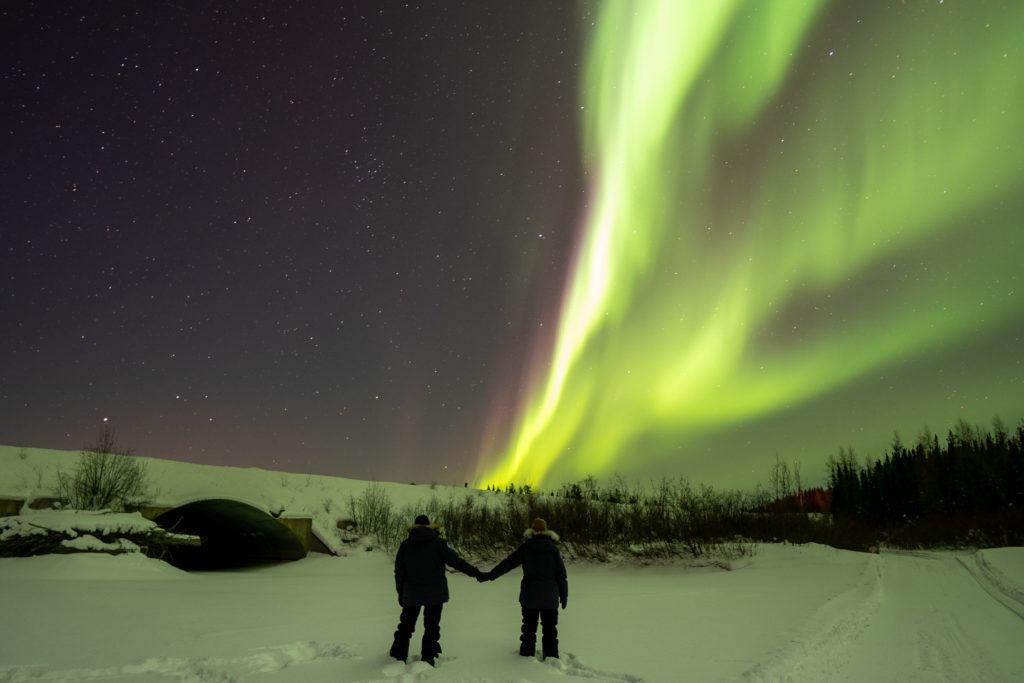
19. Marathi: mī tujhyāvara prēma karatō
Where it’s spoken: Maharashtra, Goa, Andhra Pradesh, Karnataka, Madhya Pradesh, Gujarat (India)
20. Tamil: nāṉ uṉṉai kātalikkiṟēṉ
Tamil Nadu, Karnataka (India), Puducherry (India), Sri Lanka, Singapore, Malaysia, Mauritius
21. Urdu: m – (mein ap say muhabat karta hoon) & f – (mein ap say muhabat karti hoon)
Where it’s spoken: India, Pakistan
22. Persian/Farsi: (asheghetam) used in poetry and songs – (dūset dāram)
Where it’s spoken: Iran, Afghanistan, Tajikistan

23. Turkish: seni seviyorum
Where it’s spoken: Turkey, Cyprus, Bulgaria
24. Cantonese: ngóh oi néih
Where it’s spoken: Guangdong (Canton), southern Guangxi (southern China), Hong Kong, Macau
25. Italian: ti amo
Where it’s spoken: Italy, Switzerland, San Marino
26. Thai: P̄hm rạk khuṇ
Where it’s spoken: Thailand

27. Gujarati: Huṁ tanē prēma karuṁ chu
Where it’s spoken: Gujarat (India)
28. Basque: maite zaitut
Where it’s spoken: Northern Spain
29. Minnan hua: wǒ ài rǔ
Where it’s spoken: Fujian, eastern part of Guandong (southeastern China), Hainan (southern China), Taiwan, Malaysia
30. Polish: kocham Cię
Where it’s spoken: Poland, USA, Germany, United Kingdom, Belarus, western Ukraine, Lithuania
31. Pashto: (za la ta sara meena kawom)
Where it’s spoken: Afghanistan, Pakistan
32. Kannada: Nānu ninnannu prītisuttēne
Where it’s spoken: Karnataka, Tamil Nadu, Andhra Pradesh, Maharashtra (India)
33. Malayalam: ñān ninne snēhikkunnu
Where it’s spoken: Kerala, Lakshadweep, Mahé (India)
34. Sundanese: abdi bogoh ka anjeun
Where it’s spoken: Java (Indonesia)
35. Chamorro: Hu guiaya hao
Where it’s spoken: this is a Austronesian language spoken mainly on the island of Guam, and also in the Marianas Islands.
36. Hausa: Ina son ka
Where it’s spoken: Nigeria
37. Burmese: mainnkohkyittaal
Where it’s spoken: Myanmar

38. Oriya: mu tumoku bhala paye
Where it’s spoken: Odisha (India)
39. Armenian: Yes sirum yem k’yez
Where it’s spoken: Armenia Georgi and Russia
40. Ukrainian: ya tebe lyublyu
Where it’s spoken: Ukraine
41. Bhojpuri: hum tohse pyaar kareni
Where it’s spoken: Bihar (India)
42. Tagalog: Iniibig kita
Where it’s spoken: Manila and Northern Philippines

43. Yoruba: mo nifẹ rẹ
Where it’s spoken: Nigeria, Benin and Togo
44. Maithili: hawm ahāṃ se prem karechi
Where it’s spoken: Bihar (India)
45. Sindhi: Man tokhe prem karyan ti or Man tokhe prem karyan to
Where it’s spoken: Sindh (Pakistan and neighboring areas in India)
46. Swahili: nakupenda
Where it’s spoken: Kenya, Tanzania, Uganda
Swahili is the most widely spoken language in Africa with about 100 million speakers and is the national language of Kenya, Tanzania, and Uganda.
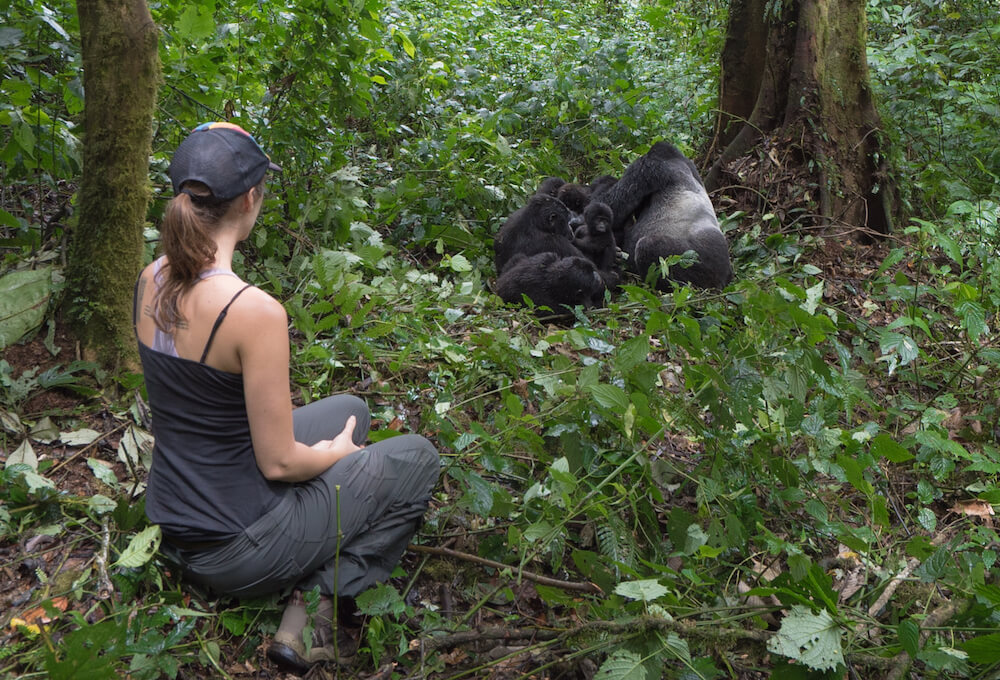
Swahili is said to have originated from Arabic, among other languages. It’s possible the language came from interactions between Arabs and East Africans back in the day.
47. Uzbek: Men seni Sevaman
Where it’s spoken: Uzbekistan
48. Amharic: ewedihalehu
Where it’s spoken: Ethiopia
49. Fula: mi yidi ma
Where it’s spoken: West and Central Africa, from Senegal to Sudan
50. Igbo: a hụrụ m gị n’anya
Where it’s spoken: Nigeria
51. Oromo: Sin jaalladha’
Where it’s spoken: Ethiopia and Kenya
52. Romanian: te iubesc
Where it’s spoken: Romania, Moldova
53. Azerbaijani: Mən səni sevirəm
Where it’s spoken: Azerbaijan and Northern Iran
54. Manipuri/Meitei: əi-nə nəng-bu nung-shi
Where it’s spoken: North East India, Bangladesh, Burma
55. Chichewa: Ndimakukonda Ndimakukondani
Where it’s spoken: Chichewa is a Bantu language spoken in parts of Malawi, Zambia, Mozambique
56. Cebuano: gihigugma TIKA
Where it’s spoken: Central and Southern Philippines
57. Dutch: ik hou van je
Where it’s spoken: Belgium (Flanders, Brussels), Netherlands and Suriname
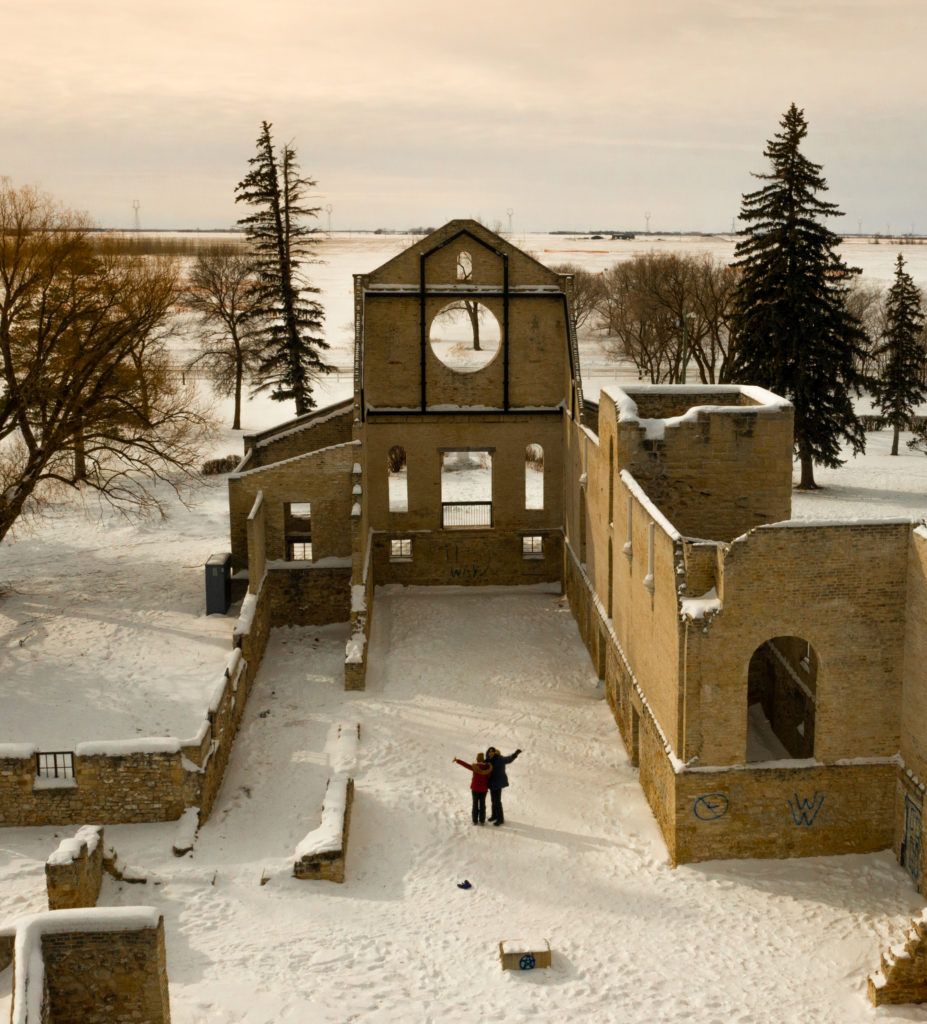
58. Kurdish: Ez hej te dikim
Where it’s spoken: “Kurdistan”, northern Iraq, Iran, Turkey and Syria
59. Serbo-Croatian: Volim te
Where it’s spoken: Serbia, Croatia, Bosnia and Montenegro
60. Malagasy: tiako ianao
Where it’s spoken: Madagascar
61. Nepali: Ma timīlā’ī māyā garchu
Where it’s spoken: Nepal and neighbouring areas, Sikkim, (India)
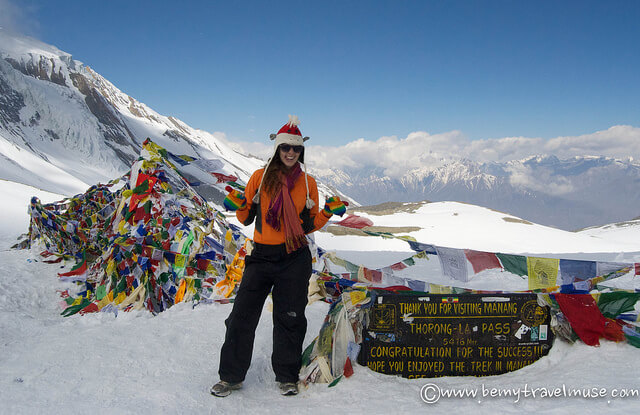
62. Saraiki: mẽ tenū̃ piār kardā hā̃
Where it’s spoken: Sindh (Pakistan)
63. Santali: ing aming sibilama
Where it’s spoken: India, Bangladesh, Nepal, Bhutan
64. Khmer: khnhom sralanh anak
Where it’s spoken: Cambodia
65. Sinhalese: mama oyāṭa ādareyi
Where it’s spoken: Sri Lanka
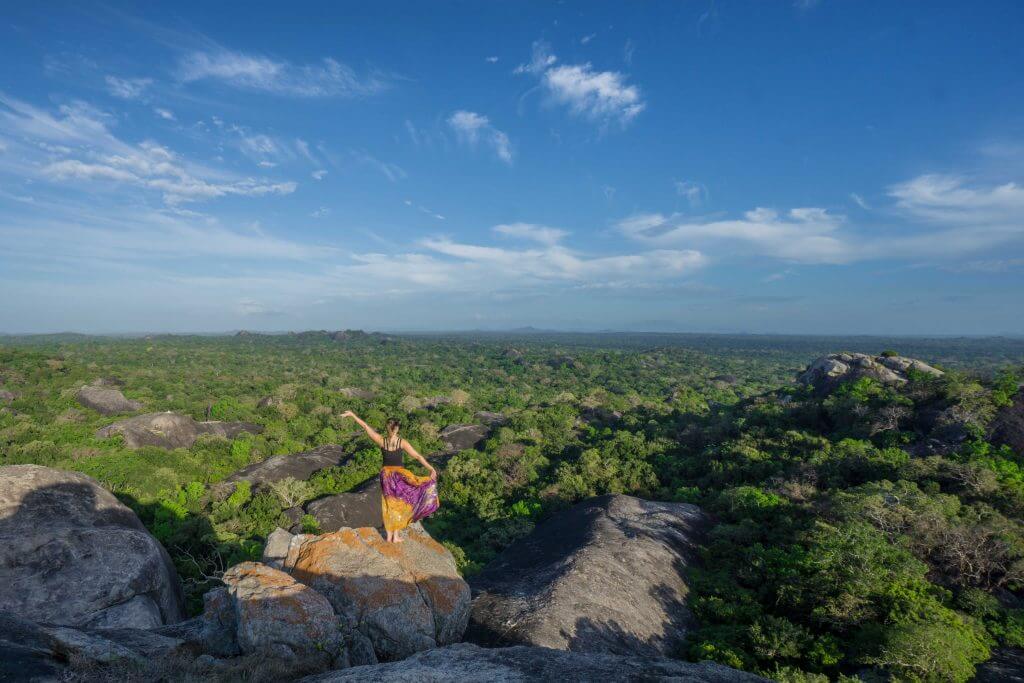
66. Bambara: M’bi fe
Where it’s spoken: Bambara is a Mali Mande language with about 3 million speakers in Mali, Burkina Faso and Côte d’Ivoire, Senegal, Gambia, Guinea, Sierra Leone, and Ghana
67. Assamese: môi apunak bhal paû
Assam (India)
68. Madurese: Kula tresna / panjengan
Where it’s spoken: Madura, and Java (Indonesia)
69. Somali: Waan ku jeclahay
Where it’s spoken: Somalia, Ethiopia, Kenya, Djibouti, and Yemen
70. Magahi: həm t̪oːraː seː pjaːr kərə hɪjoː/
Where it’s spoken: Bihar (India)
71. Dogri: Minjo tere naal pyar hega
Where it’s spoken: Kashmir Jamu (india)
72. Marwari: main tanne pyaar karoon
Where it’s spoken: Rajastan (India and Pakistan)
73. Hungarian: Szeretlek
Where it’s spoken: Hungary and areas in neighbouring countries
74. Chewa: ndimakukondani
Where it’s spoken: Malawi, Mozambique, Zambia and Zimbabwe
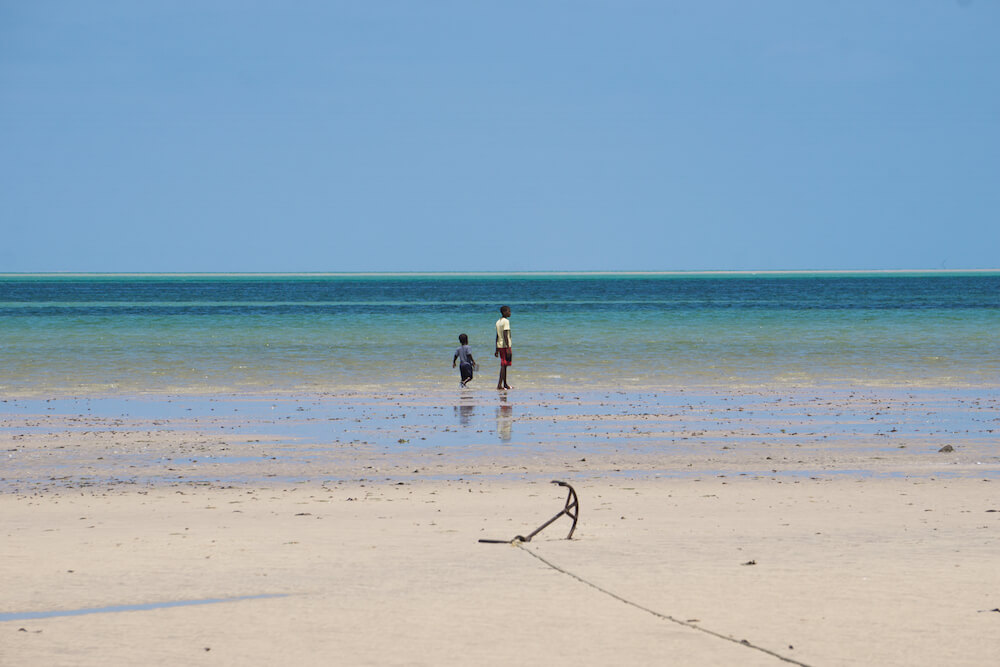
75. Kinyarwanda: Ndagukunda
Where it’s spoken: Kinyarwanda, a Bantu language spoken in mainly in Rwanda
76. Greek: Se agapó
Where it’s spoken: Greece, Cyprus
77. Akan/Twi: Me dor wo
Where it’s spoken: Ghana, Ivory Coast
78. Khasi: Nga ieid ia phi
Where it’s spoken: Meghalaya state in India by the Khasi people.
79. Kazakh: men seni jaqsı köremin
Where it’s spoken: Kazakhstan
80. Tswana: Ke a go rata
Where it’s spoken: Botswana
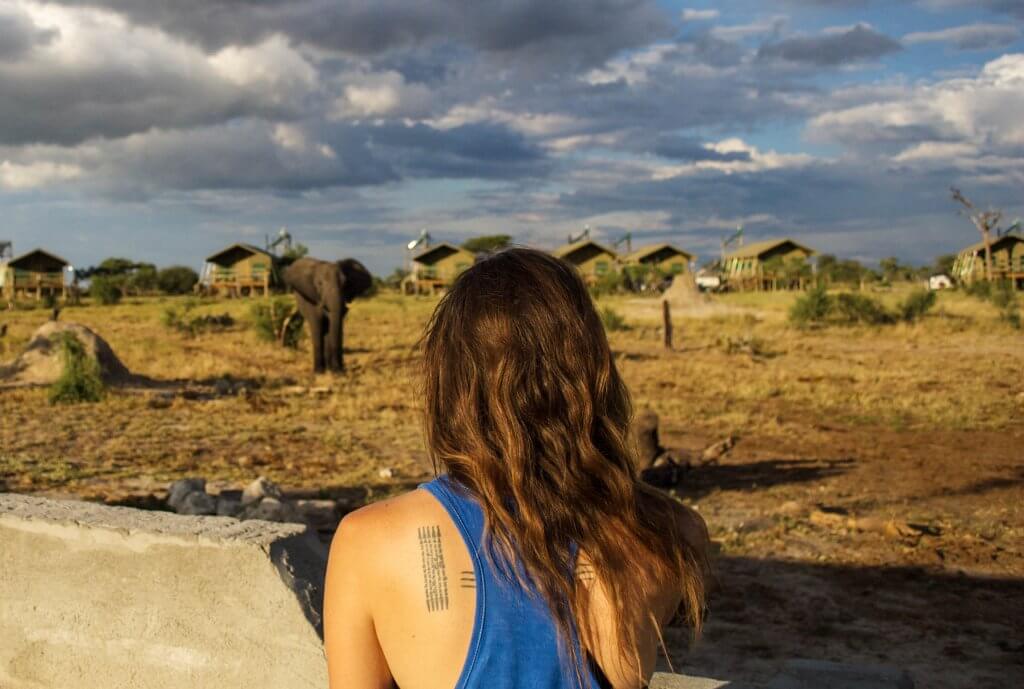
81. Hebrew: (man to a woman) –“Ani Ohev Otach”
- (woman to a man) –“Ani Ohevet Otcha”
- (woman to a woman) –“Ani Ohevet Otach”
- (man to a man) –“Ani Ohev Otcha”
Where it’s spoken: Israel
82. Zulu: Ngiyakuthanda
Where it’s spoken: South Africa
83. Czech: Miluji tě
Where it’s spoken: Czech Republic
84. Kinyarwanda: ndagukunda
Where it’s spoken: Rwanda
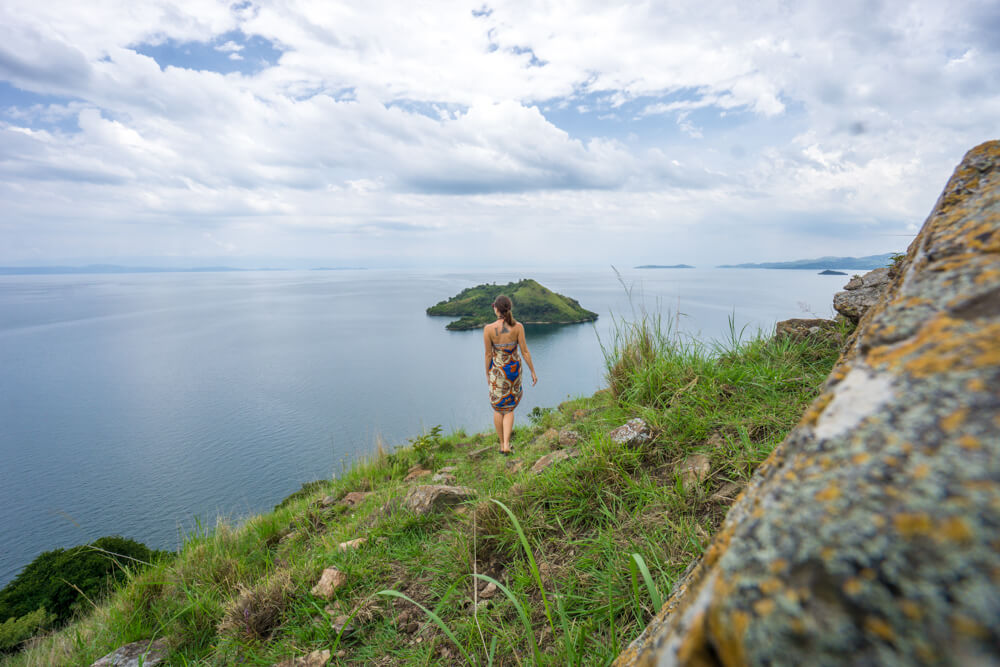
85. Kokani: hav tujo mog korta
Where it’s spoken: Goa (india)
86. Haitian Creole: Mwen renmen ou
Where it’s spoken: Haiti
87. Afrikaans: Ek het jou lief
Where it’s spoken: South Africa
88. Ilokano: Ayayatenka, (ay-aya-ten kaw)
Where it’s spoken: Northern Luzon in the Philippines
89. Quechua: Kuyayki
Where it’s spoken: Peru and Bolivia
90. Kirundi: Ndagukunda
Where it’s spoken: Burundi and Uganda
91. Swedish: jag älskar dig
Where it’s spoken: Sweden and Finland
92. Hmong: Kuv hlub koj
Where it’s spoken: Laos and neighbouring areas
93. Shona: Ndinokuda
Where it’s spoken: Zimbabwe
94. Hiligaynon: Palangga ko ikaw Guina higugma ko ikaw
Where it’s spoken: Western Visayas in the Philippines
95. Uyghur: (Män sızni söyümän)
Where it’s spoken: Xinjiang (Western China)
96. Balochi: Tu mana doost biyeh
Where it’s spoken: Balochistan (province in Pakistan and Iran)
97. Belarusian: ja ciabie kachaju
Where it’s spoken: Belarus
98. Maori: Kei te aroha au ki a koe
Where it’s spoken: New Zealand
99. Xhosa: ndiyakuthanda
Where it’s spoken: South Africa
100. Konkani: Hav tukka Mog Karta
Where it’s spoken: Goa, Karnataka, Maharashtra (India)
So whether you’re telling someone je t’aime, wo ai ni, nakupenda, or I love you, you can say it in 100 different ways today.
And of course, there’s always the good old fashioned hug and kiss, though that can vary widely from region to region too!
‘Til next time we see each other, jag älskar dig!
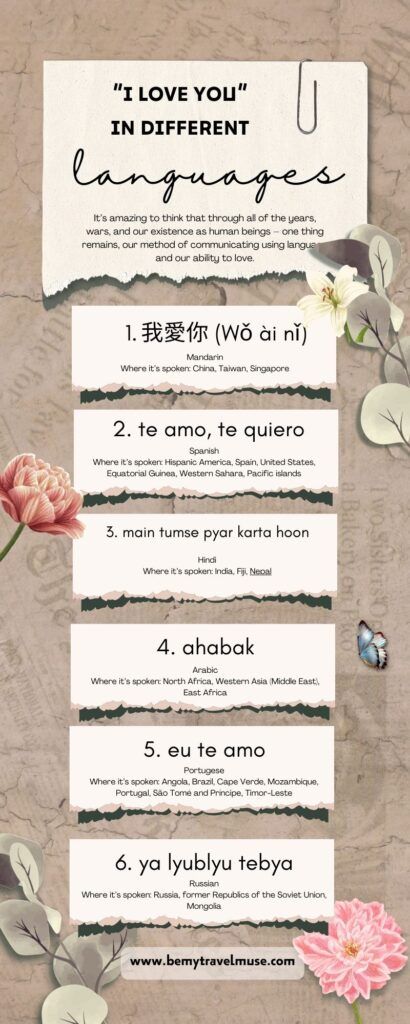
Note: Language rankings sourced from International Phonetic Alphabet based on number of speakers, and the 13th edition of Ethnologue via David P Brown. Translations sourced from Google translate and a myriad of other sources. If you see an error here, please comment and let me know!
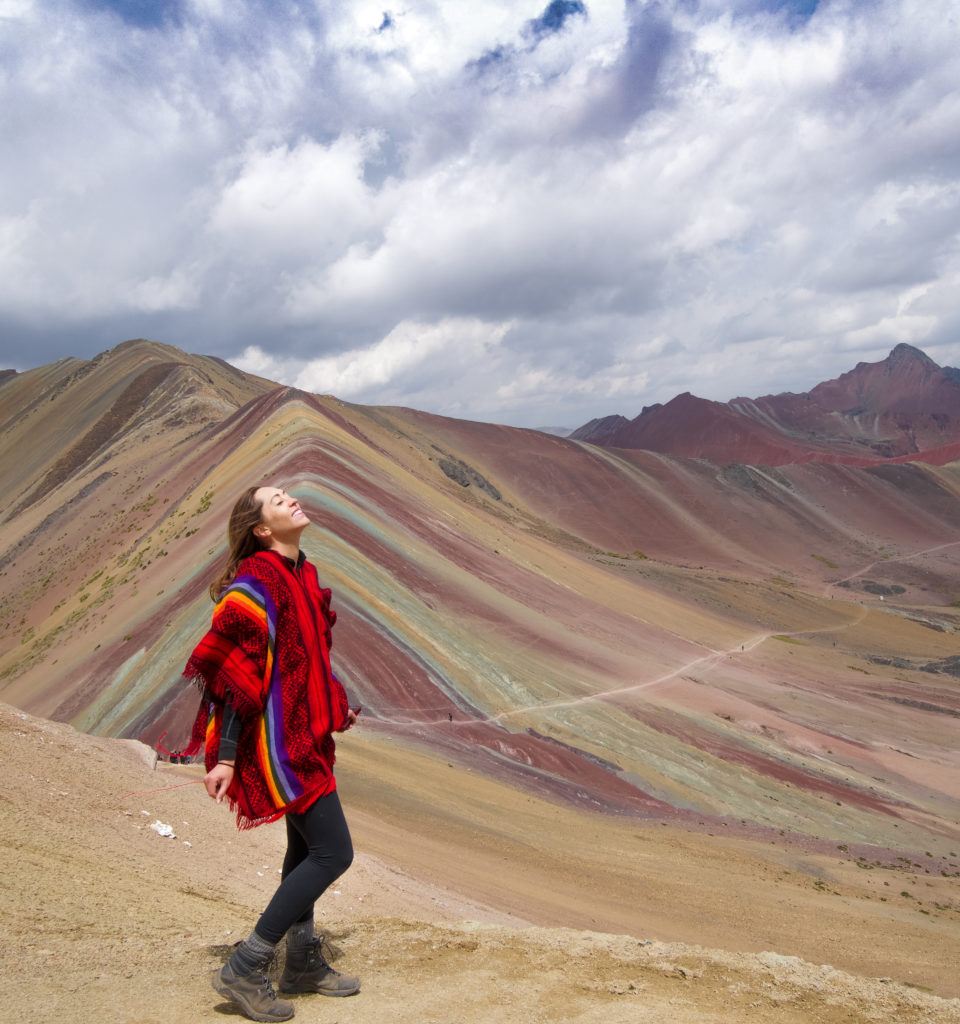
Jub says
Haha yus, this makes me so happy. I had so much fun ‘Mahal Kita’ in Tagalog (there must be two ways to say I love you?) all over the Philippines.
– 8/10 I would get laughs/Mahal Kita in return
– 1/10 didn’t flinch
– 1/10 I got a confused look.
The key is in the delivery. It makes people smile, which is awesome.
Haven’t found the ring of ‘I love you’ in Malay or Thai to be so catchy, but will be doing this again soon enough.
Endah April says
Wow you know Javanese too! I’m Javanese (and Indonesian too of course). I have correction ‘I love you’ in Indonesian, Indonesian and Malay are slightly different. ‘I love you’ in Indonesian is ‘aku cinta kamu’ or ‘saya cinta kamu’.
Kristin says
Thank you!
GG says
Hey Kristin: This is beautiful. You nailed the Hebrew BTW. Only one thing: Number 100 is not Khmer (that was number 64), I think you meant Konkani which is spoken in Goa, Karnataka, Maharashtra (States in India). I got this #100 from the source you provided and this is right below Xhosa (internationalphoneticalphabet.com). It would be “Hav tukka Mog Karta” or “Hav Tujher Mog Karta”. It seems like there is a word for “love” in every language, but not for war (Inuit don’t have such a word).
Bob says
This was really helpful as I was doing a annerversary gift for my boyfriend
Kristin says
awesome!
Sonali Roy says
That’s a good idea 😍😍
NT says
Thank you 🙂
Anonymous says
stfu
Shazz says
In Afrikaans it is actually “Ek is lief vir jou”
South African Girl 🙂
Kristin says
Thanks for letting me know!
Andreja says
Slovenian Is: LJUBIM TE (LYOOBIM TEH)
사랑해 says
In korean it is not salanghae, its saranghae
Y/N says
Thank you I used all of them for a present for my boyfriend for our three month!!
Kristin says
so cute!
Jasmin says
it’s great I’ve learned a lot of diffferent kinds of I Love you words
Vladimir Jovanov says
Where is on Macedonian language? TE SAKAM
Kristin says
We ranked them by number of speakers in the world. Thanks for sharing this, though!
Lilly says
No. 78 the correct form to say I love you in khasi is “Nga ieid ya phi ”
ieid only means love
Rami Razz says
it’s great I’ve learned a lot of diffferent kinds of I Love you words tank you
Khan Krum says
Tsk,
In Bulgaria we do not not say ‘seni seviyorum’. I even doubt the Turkish minority here use that phrase.
Kristin says
What would you say instead?
Anya says
Thank you for include Thai in your list.
I am Thai, Phm Rak Khun is correct however Phm is a pronoun for a male. To make it general you would say “Chan Rai Khun” Chan is a pronoun for any one non-sex specific.
Kristin says
Thank you!
Jeenu Bhansali says
THANK YOU.
รักคุณ
Rạk khuṇ
Rami Razz says
karnataka ,:- nanu ninannu preethi maduthene ( nanu ninnannu preethisuthene)
malayalam :- njan ninne premikunnu (njan ninne shnehikunnu)
tamil :- na unnai kadilikire (nan unnei nesikiren)
hindi:-
Jeenu Bhansali says
“Nenu ninnu premistunnanu” in TELUGU ANDHRA PRADESH INDIA
Audrey Lundberg says
No, no, no! Finnish and Swedish are NOT the same! In Finnish it’s “Rakastan sinua”. My grandparents on both my father’s and mother’s side were from Finland and my family spoke both Finnish and English.
Muriel Anderson says
Yes, my parents said “Minaa rakastan sinua” and I’ve also heard slang “ma rakastan sua” My great grandparents were Finnish
Henkku says
It doesn’t say it’s the same in Finnish and Swedish, it says that Swedish is spoken in Sweden and Finland, which is true 🙂
Saqib brahui says
I think brahui must be added too
Brahui is a widely spoken language in Asia mostly in Pakistan Turkmenistan Iran and Afghanistan also there are brahui communities in Europe.
To say I love you into brahui is (e Nehton merve kewa or kane nehton merve arre
Diana says
In Ukrianian you can also say: “ya tebe kohau”.
Kristin says
TY!
Anonymous says
The Afrikaans one can be changed to “Ek is life vir jou”
aramos says
thanks my mom/mum will be happy <3
Cristine Villanueva says
Thanks for sharing! I love to travel and this will be very helpful if I am in a country with a different language. Nice piece.
Reddy says
Thank you ❤️☺️☺️☺️☺️
Chasm Diver says
Hi Kristin.
I discover your thread with some delay..
Cute idea, and great job.
Note however that the internationalphoneticalphabet’s ranking of languages by number of locutors is quite, say… suspicious.
For instance, I have been living in North Africa. The arabic that people speak there is to Egyptian Arabic what Schwyzer Tüüutsch is to German, Ukrainian to Russian, or portugese to spanish. An large parts of the marocan population speak arabic as a foreign language, just like most Ivorians speak French. So the counting of arabic is not serious. Furthermore, difficult to believe that basque would be more spoken than polish or swahili.
Kind regards, and good trips
Kristin says
We based on on a few different resources that collected the data, but you’re right it’s tough to truly know for sure how many speakers of a language there are in the world.
Ana says
Error: in Ukrainian – ya tenemos kohau
Carlos Fernandes says
I would like to see if was possible to have a easy way to learn ancient Sumerian
AuggieTheFroggy says
I’m using this for a drawing for my boyfriend, it had two hands making a heart, inside the heart is “I love you.” In English, and then it’s surrounded by the other languages saying “I love you.” We’ve been together for a year and a half, lol.
eli_playz03!!! says
This website helped me a lot because i was making a card for my moms birthday. she turned 33 today
Smile says
It’s
awesome 👌
Iris says
I’m sure about, i can’t record the 100 form of say I love you, but the picture is wonderful. My favorite word is Wo ai ni.
Emma Miller says
Man I literally read it every other language how to speak I love You ..its so very informative. It really helpful for those who dont know how to speak other languages like me. Thanks for this. Keep it up!
Mark says
There is an error and a left out. For Tagalog. My filipina fiance said its MAHAL KITA. you have it wrong.
Second of all you left out sign language. The universal sign concept for I love you is English but with fingers. Rhis has ro be about 10 percent of world population know this. Please correct and add rhe ASL sign for ILY.